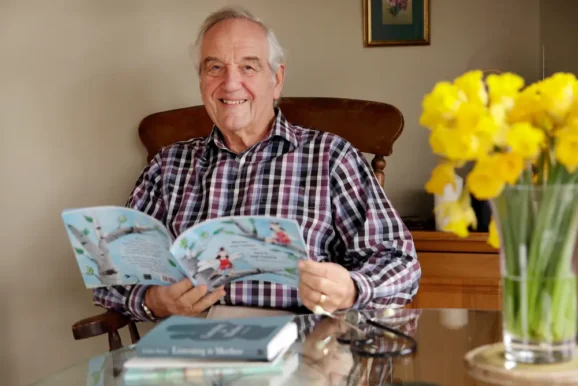Once one of the UK’s leading paediatricians, retired doctor Colin Stern has transformed himself into a prolific author, crafting engaging works for both children and adults. Despite the shift in careers, his unwavering commitment to enhancing people’s well-being remains.
Throughout his distinguished four-decade medical career, Dr. Colin Stern helped thousands of children—and their worried families—find relief and healing.
Working at Guy’s and St Thomas’ Hospital (GSTT) in central London, he frequently encountered rare and perplexing medical cases that had confounded other doctors and were referred to him directly.
Among these intriguing cases was a teenager who seemed lost in daydreams, a young girl who was averse to long walks, a baby who cried incessantly, and a boy who claimed his tummy conversed with him at night.
Colin’s extensive experience and keen observational skills allowed him to quickly uncover the underlying issues, no matter how peculiar they appeared. In most instances, this led to joyful resolutions for his young patients.
However, there were times when medical science couldn’t provide solutions, resulting in the most challenging conversations with parents.
Regardless of the situation, Colin always exhibited an exceptional bedside manner, a skill cultivated through years of practice.
That same quality of empathy, warmth, and understanding is evident in his “new” career as an author.
Now in his eighties, Colin retired from medicine in 2006 after serving as the Clinical Director of Paediatrics at Guy’s.
He spent his newfound free time traveling and engaging in sports such as golf and fencing, but his passion for creative writing, which had bubbled beneath the surface since his youth, eventually drew him back in.
The turning point came in 2020 when his beloved wife, Ann, passed away after over 40 years of marriage, during which he care for her as she fought a rare form of dementia.
In his grief, Colin began to express his emotions through poetry. This initial cathartic release soon turned into a desire to compile and share his work to assist others going through similar mourning.
His poignant collection, A Catafalque for Ann, was published in 2021, igniting a passion for writing that he hadn’t anticipated.
This was soon followed by a whimsical children’s fairytale adventure, Never-my-name and Isn’t-my-name: naughty fairy twins, inspired by bedtime stories he created for one of his grandchildren.
Returning to poetry, he released Sailor-Y-Pent, a cheeky narrative poem set in a fictional Welsh seaside town during the 1960s, reminiscent of Dylan Thomas’ Under Milk Wood, but with a comedic twist.
Colin’s latest offering continues his genre-blending approach with a medical memoir titled Listening to Mother, showcasing some of the most memorable and unusual cases he encountered as a paediatrician.
With a lyrical talent that seamlessly weaves between imagination and reality, Colin Stern masters the art of storytelling and poetry, engaging readers of all ages. His writings possess a timeless charm, whisking readers away to enchanting realms, exploring the richness of human emotions.
“This is the antithesis of a typical modern medical memoir,” Colin explains. “Where most such books tend to be negative and critical of the NHS, I wanted to highlight the dedication of doctors working hard to help their patients.”
“The challenges faced by the NHS are extensively covered in the media, but the stories of devoted doctors often remain untold.”
“Thus, I felt it was vital to share my experiences, providing reassurance to parents of sick children while also offering an interesting read for everyone else.”
He adds, “Certainly, during my career, I encountered some unusual and complex cases, but my overarching goal was always to bring a smile to my patients’ faces and their parents’ too.”
“The doctor-patient relationship has always been crucial for achieving the best outcomes, a principle that remains relevant today, although I recognize that younger doctors face more challenges with increased bureaucracy often cutting into their time with patients.”
Colin expresses empathy for the immense pressures currently placed on doctors, having played a critical role in shaping the careers of future medical professionals while serving as a postgraduate dean at Guy’s.
He also collaborated closely with doctors researching new treatments for childhood illnesses, managing a research team and laboratory at the Rayne Institute, St. Thomas’ Hospital.
Yet, despite the demands of regularly working 70-hour weeks, he never ceased to engage with young patients.
“Oh no, I couldn’t have stepped away from that,” he insists. “It was too enjoyable and deeply fulfilling.”
“Of course, there were moments of sadness—such is the nature of life—but the joy of helping a sick child return to health, allowing them to embrace their childhood, was profoundly rewarding, and it continues to inspire me.”
Therefore, it’s no surprise that his current writing endeavors include a variety of children’s books, along with poetry collections like A Children’s Charivari and The Disappearing Dodo and Other Awkward Avians.
“Poetry is arguably my favorite literary form. My passion was ignited during my school days when I was part of a literary society and received guidance from renowned poets like Siegfried Sassoon, John Betjeman, and Louis MacNeice.”
“Poetry is particularly significant for children, as it aids in language development. I proudly embrace traditional styles, favoring rhyming verses, which I believe are more engaging.”
“The rhythm of rhyming poetry makes it entertaining to read, which is vital for capturing young readers’ attention, otherwise, they might not engage with the content, no matter how meaningful it is.”
“I’m especially excited about the approaching release of The Disappearing Dodo and Other Awkward Avians. It’s a whimsical collection featuring fantastical birds like The Biscuit Hopper, The Picassowary, The Electric Rail, and The Disappearing Dodo.”
“If young readers experience even half the joy in reading it that I had in writing it, I truly will be a happy man!”
For his latest children’s books, Colin once again collaborates with the talented illustrator Emily Luke, who brought his fairytale adventure Never-my-name and Isn’t-my-name: naughty fairy twins to life.
“She’s absolutely wonderful,” he exclaims. “I was introduced to her during the writing of Never-my-name, and I never looked back.”
“Her illustrations are magical, bringing my words to vivid life. I feel honored to have Never-my-name labeled as a modern classic by readers, and Emily deserves significant credit for that.”
“The possibility that my simple books could entertain future generations is as delightful to me as having improved the lives of countless children throughout my medical career.”
All of Colin Stern’s books – Listening to Mother, A Catafalque for Ann, Never-my-name and Isn’t-my-name, and Sailor-y-Pent – are published through Brown Dog Books and can be purchased on Amazon. For more information, visit www.ColinStern.co.uk
Q&A Interview With Author Colin Stern
We caught up with retired paediatrician turned author Colin Stern to delve into his esteemed medical career and his transition from a physician’s notes to entertaining poetry and prose.

Q. What do you consider your greatest achievement in your medical career, and why?
A. Becoming an experienced and skilled clinician. While it may not sound dramatic, reaching a point in my career where others recognized my ability to solve complex medical issues is very gratifying.
Q. You share some of your more unique medical cases in your memoir Listening to Mother. What do you think readers will take away from it?
A. I hope they find reassurance. Recent medical books, like Adam Kaye’s This is Going to Hurt, often depict the NHS negatively. I think that’s not the whole story, and my book, Listening to Mother, provides a more optimistic perspective.
Q. Listening to Mother reflects an earlier era. How do you believe the doctor-patient relationship has evolved since you began your practice? Is this evolution positive or negative?
A. While medical practice has changed significantly, the field of paediatrics has seen less transformation. Being involved in family medicine means that if you struggle to communicate effectively, you might not succeed in this field. As a result, relationships among doctors, patients, and parents have generally remained strong, with other specialties gradually catching up.
Q. How difficult has the transition been from doctor to author? What brings you the most satisfaction in your writing career?
A. Honestly, it wasn’t much of a transition. I have always enjoyed writing; however, medicine demanded a lot of my time, and there were periods when I juggled various roles simultaneously. Writing took a back seat for a long time. After nursing my wife for over five years, her passing prompted me to dive back into writing.
Q. Who have been the biggest influences on your writing style?
A. As a child, I had the fortune to meet T. S. Eliot, Siegfried Sassoon, Louis MacNeice, and John Betjeman, who were all my literary heroes. My reading taste is vast, spanning from Rudyard Kipling to W.H. Auden, Virginia Woolf to Kazuo Ishiguro, and Ernest Hemingway to Samuel Beckett. I read anything I can get my hands on, putting it down only if it’s poorly written. I credit much of my writing to these authors, as I read them during my formative years.

Dr. Colin Stern’s latest book, Listening to Mother, is a medical memoir that highlights some of his most memorable and extraordinary experiences as a paediatrician.
Q. If you had to choose between poetry, children’s fiction, and adult fiction, which would you prefer and why?
A. While I particularly enjoy writing for children, about two-thirds of my poems are for adults, and I’m currently working on a novel for grown-ups. I love creating comic verse and embracing fantastical elements, as I don’t see much of that style of poetry being produced today. However, I’m content writing in any genre; for me, writing is writing.
What has been the most fulfilling aspect of your medical career compared to your writing journey?
A. The absolute joy of being a paediatrician was working with children, who are consistently delightful individuals. I was incredibly fortunate to have a fulfilling career in medicine. Although I wrote little during that time due to my busy schedule, I now find immense joy in writing and hope my work brings happiness to others.
What can readers expect from your upcoming releases, and why are you excited about them?
A. One book, The Disappearing Dodo and Other Awkward Avians, is nearing completion and will be published in the next few months. It features a whimsical assortment of poems about peculiar birds, including The Ink Lark and The Picassowary. Some will be humorous, while others have a bit of bite, but I believe readers will find them quite enjoyable.
Following that, I’m preparing a collection of children’s verse titled A Children’s Charivari, and a children’s saga called The Rainbow Mace. Both are fully written and are just awaiting illustrations.



